-
 Published: Jul 1, 2024
Published: Jul 1, 2024
-
 15 min. read
15 min. read
-
 Celeste Yates
Celeste Yates Content Writer
Content Writer
- Celeste has worked in the online marketing space for twenty years. She has written for sectors including tourism, sustainability, education, lifestyle, food, and marketing. You can find her work featured by Green Building Media South Africa, Stodels Gardening, and The Post House Hotel. In magazines, you may have seen her in The Cape Times, Oprah South Africa, and The Property Magazine. While you can find her writing up on the latest SEO trends and exploring digital techniques during the day, her love of story-telling carries on in enriched games and books after hours.
Competitors have a huge influence on your company. They might not walk into your storefront and pull your customers out by the arm to steal them from you, but if you’re still asking, “Who are my competitors online?” they might as well be.
When you know precisely who your online competitors are, you’ll have the upper hand in winning customers — but we’ll get into that later. On this page, we’ll answer the following questions:
- Who are my competitors online?
- How can I spy on competitors?
- How do I do competitor research?
- What are some competitor analysis tools I can use?
Keep reading to get the whole scoop! If you’d like to consistently learn more about beating your competitors with marketing and advertising, sign up for Revenue Weekly!
How can knowing your competitors help you win customers?
When you can confidently answer the question, “Who are my competitors online?”, you’ll be able to follow your competitor’s lead, beat them to customers, and rank higher than them in search results on Google.
Doing so requires time and effort, but if you want to win customers and grow your business, knowing your competitors is one of the best ways to do so.
Keep reading to learn more about why knowing your competitors is crucial to your company:
Your competitors have the same target audience
This means that your ideal customer will likely come across your competitor’s business when searching for products and services online. When both you and your competition show up in search results for the products and services you offer, your target audience is left to choose between you, your top competitor, and hundreds of other competitors in search.
Here are a few things that might dictate which search result your target customer chooses to click:
- How highly it ranks
- If the title tag includes a keyword related to what they’re looking for
- If the meta description entices them
- If the product shows up as an ad or an organic result (depending on what they’re looking for)
With all these factors playing into a user’s choice, it’s crucial that you know your competition and how they market their products and services so that you have a fighting chance of winning over your (and their) target audience.
You see what they do right (and can copy it)
Typically, a competitor is a competitor because they’re hard to beat. Whether that means they’re hard to beat in search, storefront visits, or customer service, your competitors get labeled as such for a reason. When a business in your industry is doing well, one of the smartest things you can do is take note of what they’re doing.
When you take a page from their book, it can help you come out on top — another reason why knowing your competitors is important for helping you win customers.
You’ll know who to keep an eye on
When you know who your top competitors are, you’ll know who to watch. When you’re aware of your competitors, you can track things like:
- What keywords they target
- How they rank in search
- What events they hold
- Which social media networks they use
- How much they charge for similar products
- And so much more
Knowing this valuable information can help you win customers by:
- Targeting related keywords and beating them in search results
- Holding similar events
- Being active on social media
- Providing unique promotions for similar products
Types of competitors
If you were a small shop that sold stationery, your competitors might be other shops that sold similar stationery near you. Or perhaps you might also have a larger wholesale competitor a few blocks over. However, online competitors are not as straightforward.
In fact, some competitors might not even sell stationary. But because they are engaging with the same target audience as you, they are now a competitor.
Direct competitors
Direct competitors are the same as traditional competitors. They are two companies with similar products or services and the same target audience. A good example would be Pepsi and Coca-Cola.

Here are two companies that are in the business of selling soft drinks. They have similar brand colors and are all trying to tap into the same target audience. They are stronger competitors than most.
Indirect competitors
Indirect competitors are ones that offer something similar and are competing for the same target market. This type of competitor is strong in the online space, and you might not even realize it.
For example, let’s look at the local gym. Now, usually, the gym’s competitors would be other gyms, right? But now, if we go online, their indirect competitor might be a gym app. It offers a similar product as the gym but allows users to get toned at home.
They are both targeting clients who want to get fit, so they are both competing in the same space, even though one has a location and the other doesn’t.
Let’s look at another example.
Avis is a car rental company and offers one type of transportation solution. But then again, so does Uber. They both target users who need to get from A to B, but they offer different types of solutions.
Your indirect competitor might not be someone that you consider in competition with you, with regards to products or service, but because they are targeting the same audience, you are now in the same space.
Similar competitors
Some competitors sell similar products to yours, but with one change. They might be more affordable, and you are high-end, or vice versa. For example, Lexus and Toyota both sell cars, but Lexus cars are high-end luxury vehicles. Toyota, on the other hand, caters to lower and middle-class people who just want a reliable car.
So while these competitors sell the same product, who they’re targeting isn’t the same.
The real question: Who are my competitors online?
Now that we’ve covered why it’s important to know your competitors, let’s talk about how to find your competitors online. There is a wide variety of competitor research strategies, and we’ll talk about them now.
1. Start by finding your top keywords and who ranks for them
Regardless of your industry, it’s essential to know what keywords mean the most to your business. These are your most valuable keywords — terms you want to rank highly for in search. To first identify those keywords, follow these steps:
- Create a shortlist of keywords that come to mind (These will most likely be the products and services that you offer)
- Expand on the list by entering those keywords into a tool like KeywordsFX
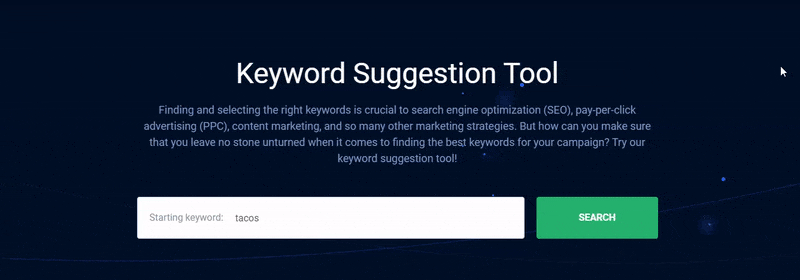
Now that you have your eye on these valuable keywords, you’ll can search for them on Google and see who appears at the top of search results. These are your top competitors since they appear in search results for keywords you want to show up for, too. It also means they offer the same products or services and share a similar target audience.
Oh, and it also means they have a solid marketing strategy to rank highly for their target keywords.
2. Google your products and services
 Perform a quick Google search of the products and services that you offer. Any company that ranks on the first page is your most serious competition, but don’t lose sight of those ranking on page two, either.
Perform a quick Google search of the products and services that you offer. Any company that ranks on the first page is your most serious competition, but don’t lose sight of those ranking on page two, either. 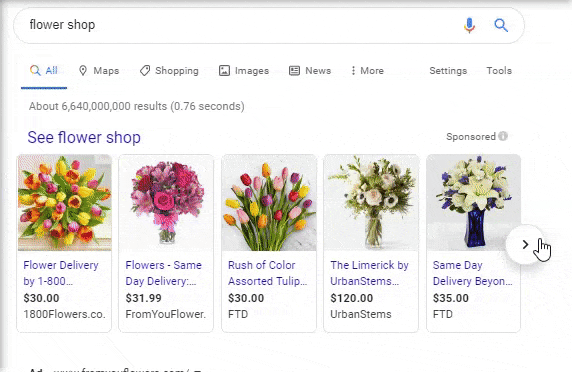 When you google your products and services, it gives you two pieces of crucial information:
When you google your products and services, it gives you two pieces of crucial information:
- Who your top competitors are (companies that rank for the same keywords you want to target)
- How much ground you have to make up
For example, if you don’t rank on the first page at all, you know that you have some work to do.
Keep in mind that even if you rank in a top position in search, it doesn’t mean that your competitors aren’t dangerous. Search engine results change all the time, and there are no warning signs for when your competitors are about to take over your ranking.
You’ll want to take note of businesses that appear on pages one and two.
3. Rinse and repeat as a local search
Perform another Google search of your products and services, this time with your location attached. For example, if you’re a flower shop operating in Johnstown, PA, try googling “flower shop Johnstown Pennsylvania.”  The results you see for your local search will give you insight into your local competitors. If you’re a local business without an online ecommerce store, or you don’t have more than one location, these competitors are going to be your most dangerous.
The results you see for your local search will give you insight into your local competitors. If you’re a local business without an online ecommerce store, or you don’t have more than one location, these competitors are going to be your most dangerous. 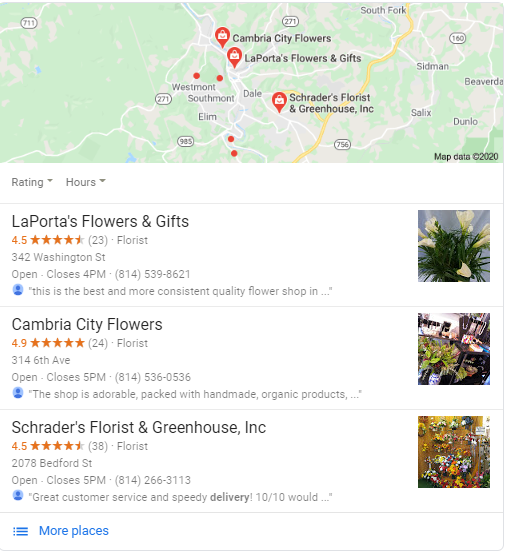
4. Check out ranking sites
Find your top competitors by searching for your industry on review sites. For example, if you’re a plumber, try typing “plumbing [location]” into Yelp.  The results will show you the top businesses in your area that match your industry. Since these companies are considered “top-ranked” in your area, you can bet that they’re some of your biggest competition. You can also check out ranking sites like HomeAdvisor and Angie’s List.
The results will show you the top businesses in your area that match your industry. Since these companies are considered “top-ranked” in your area, you can bet that they’re some of your biggest competition. You can also check out ranking sites like HomeAdvisor and Angie’s List.
5. Use competitor analysis tools
Finally, one of the best and most reliable competitor research strategies is using competitor analysis tools. Keep reading to learn about our favorite tools for helping you spy on your competitors.
How can I spy on competitors? 7 tools to help
Now that we’ve talked about the ways you can find your competitors online, it’s time to dive a little deeper into our last strategy — using competitive intelligence tools.
So, the answer to the ever-popular question, “How can I spy on my competitors?” Use these tools!
1. Ahrefs
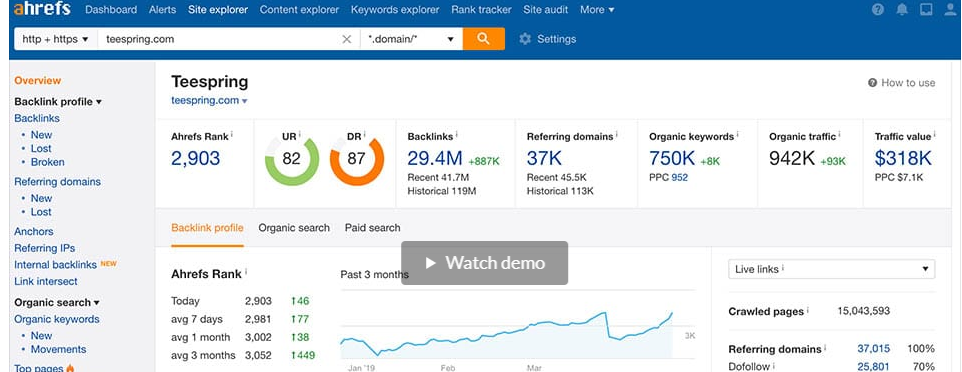 Ahrefs is an amazing tool that allows you to look directly into a competitor’s organic search traffic —you can even use it as a Google position check tool. In addition, you’ll be able to analyze their backlink profile, their keywords, and even their paid search metrics. With that kind of insight, you’ll have a full picture of what you have to do to win their customers and outrank them in search.
Ahrefs is an amazing tool that allows you to look directly into a competitor’s organic search traffic —you can even use it as a Google position check tool. In addition, you’ll be able to analyze their backlink profile, their keywords, and even their paid search metrics. With that kind of insight, you’ll have a full picture of what you have to do to win their customers and outrank them in search.
2. SEMrush
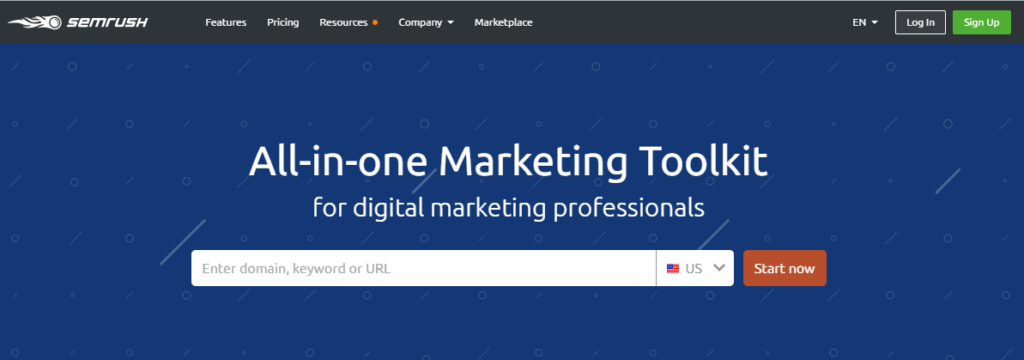 How does your online presence compare with your competition? SEMrush can help. SEMrush provides SEO audits to help you understand where your campaign stands, plus includes position tracking, competitive intelligence, backlink audits, and even ideas for helping you gain more organic traffic. With their competitive intelligence, they provide metrics to help you understand where your competitors rank and how you can get there.
How does your online presence compare with your competition? SEMrush can help. SEMrush provides SEO audits to help you understand where your campaign stands, plus includes position tracking, competitive intelligence, backlink audits, and even ideas for helping you gain more organic traffic. With their competitive intelligence, they provide metrics to help you understand where your competitors rank and how you can get there.
3. Buzzsumo
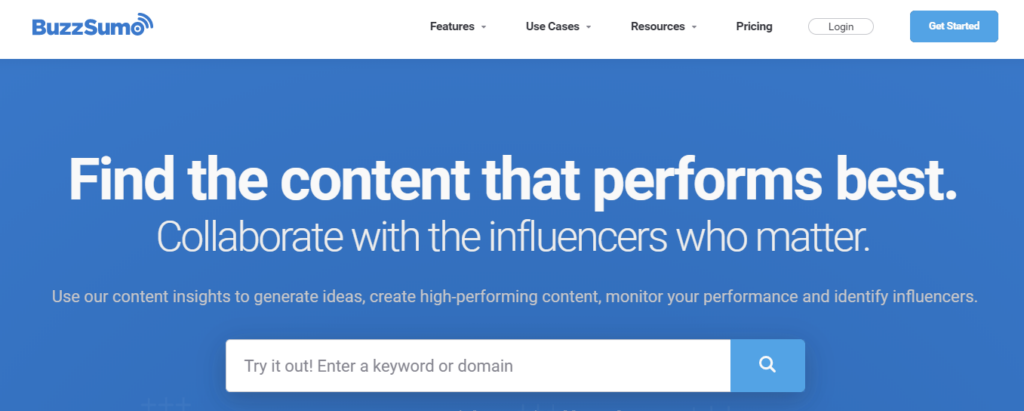 Buzzsumo is a fantastic tool for helping you find the kinds of content that perform well in your industry and for your top keywords. Although it doesn’t directly point out your competition, it gives you a great idea of what kind of content you’ll have to write to compete with top-ranking businesses.
Buzzsumo is a fantastic tool for helping you find the kinds of content that perform well in your industry and for your top keywords. Although it doesn’t directly point out your competition, it gives you a great idea of what kind of content you’ll have to write to compete with top-ranking businesses.
4. Searchmetrics
 Searchmetrics provides some of the greatest insights into you and your competition’s content and online presence. The platform provides a variety of metrics that help you determine areas of opportunity that your competitors aren’t currently capitalizing on — giving you the upper hand in customer acquisition. The platform can help you determine and target your ideal audience with the right message at the right time and provides extensive analytics to back up your strategies.
Searchmetrics provides some of the greatest insights into you and your competition’s content and online presence. The platform provides a variety of metrics that help you determine areas of opportunity that your competitors aren’t currently capitalizing on — giving you the upper hand in customer acquisition. The platform can help you determine and target your ideal audience with the right message at the right time and provides extensive analytics to back up your strategies.
5. Similarweb
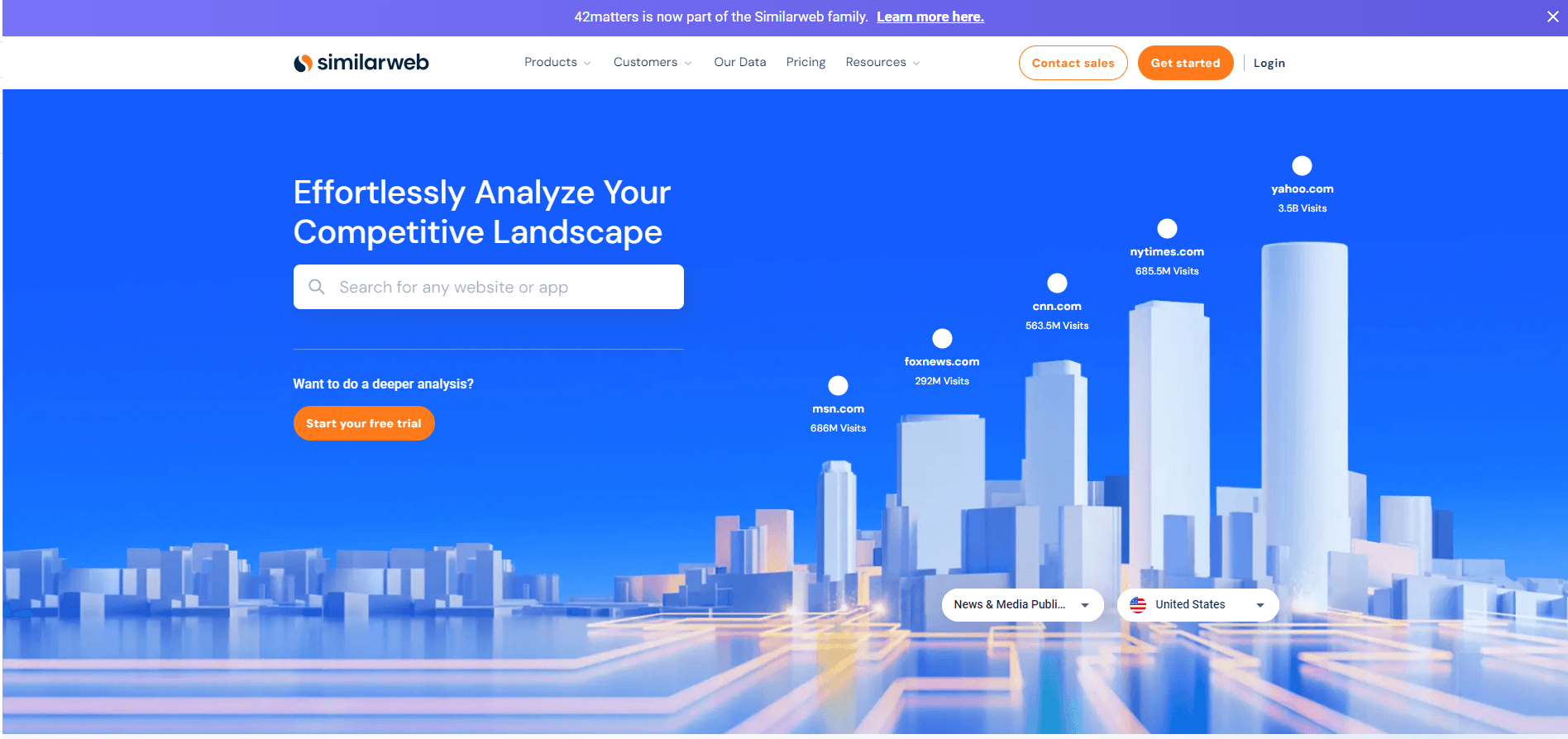
Similarweb offers services for measuring and analyzing website traffic and performance. Through their site, you can track competitors and get data on web traffic sources, user behavior, and engagement metrics. From there, you’ll be able to identify opportunities on where you can fit in as well as how you can market your product/services differently from competitors.
6. Majestic
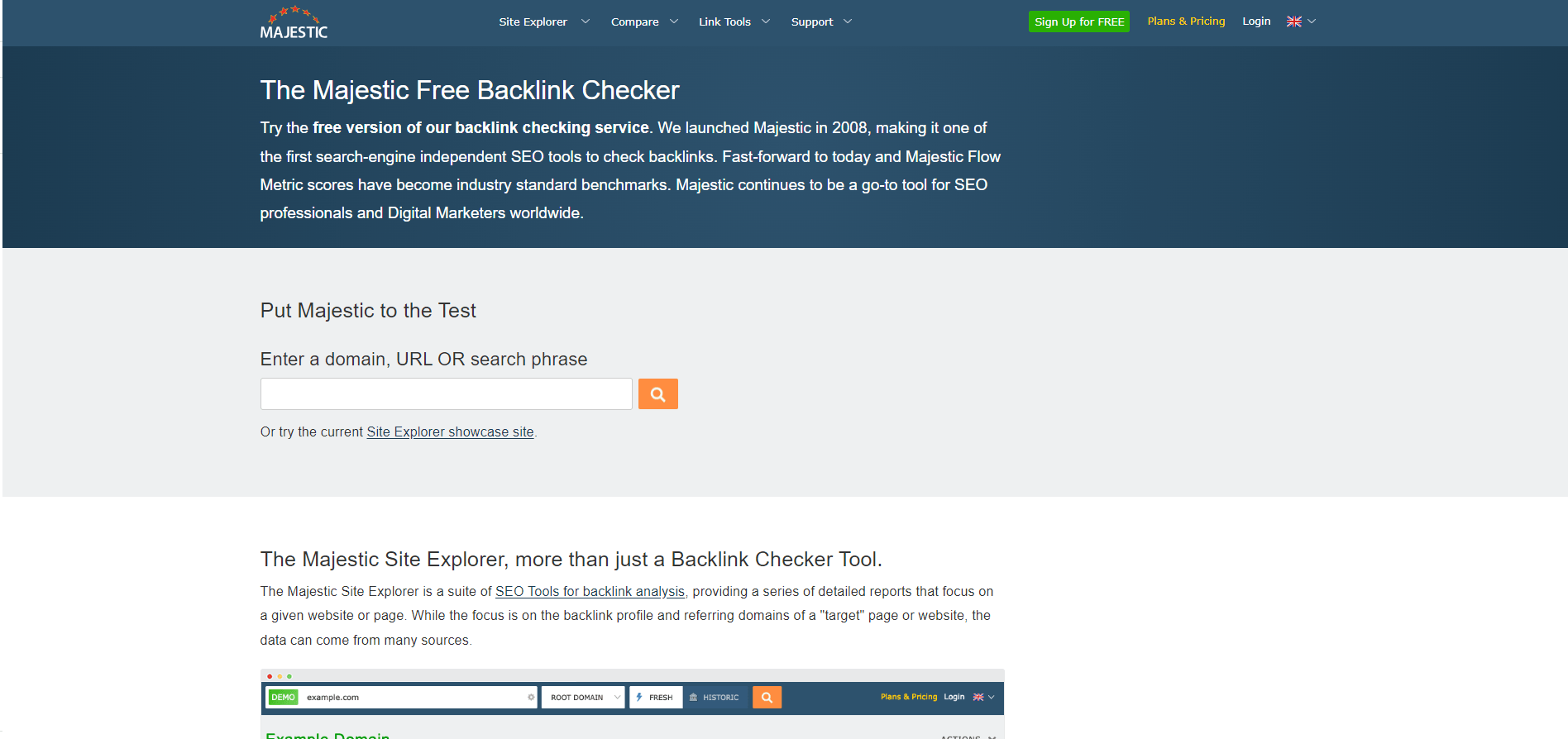
Majestic offers a free backlink checking service. It is not as well known as some other larger websites, but it gives you detailed information and insight into your competitor’s backlink profile.
You can also get information into their flow metrics and use the information as part of your own link-building strategy.
7. SpyFu
 If you’ve ever wanted a tool that could help you see every keyword that your competition has an ad for, ranks for organically, and more, SpyFu is the tool for you. This intelligent tool helps you increase your website traffic by helping you understand how your competition performs in search and beyond. They provide competitor SEO keywords, a complete keyword ranking history, competitor backlinks, and so much more.
If you’ve ever wanted a tool that could help you see every keyword that your competition has an ad for, ranks for organically, and more, SpyFu is the tool for you. This intelligent tool helps you increase your website traffic by helping you understand how your competition performs in search and beyond. They provide competitor SEO keywords, a complete keyword ranking history, competitor backlinks, and so much more.
Different types of competitor analyses you can conduct
Once you have a list of your competitors and what type of competitors they are, you can start breaking down their different strategies into categories, such as their social media strategy, content management, and paid advertising.
Within each one, you can look at their strengths, challenges that could be opportunities for you, and what you can learn from their campaigns by conducting a SWOT analysis.
Social media competitor analysis
One area to break down is the way your competitors interact with their audiences on social media. You can analyze various areas to see how they are engaging and if it is a positive or negative opportunity.
Key areas to look at include:
- What platforms are they using and are active on?
- What content do they post, such as images, videos, or articles?
- Are they getting responses, such as ‘likes’ or comments?
- Does the number of their followers increase over time?
- Do they have any collaborations with influencers?
Tools that can help you get further information about your competitors include:
- Hootsuite
- Sprout Social
- Rival IQ
- BuzzSumo
Competitor paid marketing analysis
It would be amazing to be invited to your competitor’s marketing meetings and listen in on their budget and keyword focus for the month, but unfortunately, that would never happen. However, you can break down their strategies by looking at what ads currently run.
A pay-per-click (PPC) analysis will show you their calls to action and marketing message. You can identify the keywords they are bidding on by using tools such as Google Ads, Semrush, and Spyfu.
Content marketing strategy
Take a look at your competition’s website to see if they have any content strategy in the form of news, blogs, podcasts, and videos. See if you can find any other forms of content such as webinars or ebooks.
Evaluating your competitors’ content can help you get ideas for your own, as well as find new keywords to target on your website.
You can evaluate the organic search performance of their content by checking for keyword rankings and traffic.
Tools that will give you insights include:
- Ahrefs
- Contently
- BuzzSumo
Who are my competitors online? Let WebFX help you find out!
If you’d like to work with an expert to spy on your online competitors, WebFX is here for you.
We’ve been helping clients rank better in search for over a decade, and our real results speak for themselves. We’ll get to know you and your competition and help construct a unique, custom digital marketing strategy that enables you to outrank competitors in search and increase conversions. If you’re ready to get started, contact us online for a free quote or give us a call at 888-601-5359!
-
 Celeste has worked in the online marketing space for twenty years. She has written for sectors including tourism, sustainability, education, lifestyle, food, and marketing. You can find her work featured by Green Building Media South Africa, Stodels Gardening, and The Post House Hotel. In magazines, you may have seen her in The Cape Times, Oprah South Africa, and The Property Magazine. While you can find her writing up on the latest SEO trends and exploring digital techniques during the day, her love of story-telling carries on in enriched games and books after hours.
Celeste has worked in the online marketing space for twenty years. She has written for sectors including tourism, sustainability, education, lifestyle, food, and marketing. You can find her work featured by Green Building Media South Africa, Stodels Gardening, and The Post House Hotel. In magazines, you may have seen her in The Cape Times, Oprah South Africa, and The Property Magazine. While you can find her writing up on the latest SEO trends and exploring digital techniques during the day, her love of story-telling carries on in enriched games and books after hours. -

WebFX is a full-service marketing agency with 1,100+ client reviews and a 4.9-star rating on Clutch! Find out how our expert team and revenue-accelerating tech can drive results for you! Learn more
Try our free Marketing Calculator
Craft a tailored online marketing strategy! Utilize our free Internet marketing calculator for a custom plan based on your location, reach, timeframe, and budget.
Plan Your Marketing Budget
Table of Contents
- How can knowing your competitors help you win customers?
- Your competitors have the same target audience
- Types of competitors
- The real question: Who are my competitors online?
- How can I spy on competitors? 7 tools to help
- Different types of competitor analyses you can conduct
- Who are my competitors online? Let WebFX help you find out!

Proven Marketing Strategies

Proven Marketing Strategies
Try our free Marketing Calculator
Craft a tailored online marketing strategy! Utilize our free Internet marketing calculator for a custom plan based on your location, reach, timeframe, and budget.
Plan Your Marketing Budget
What to read next





